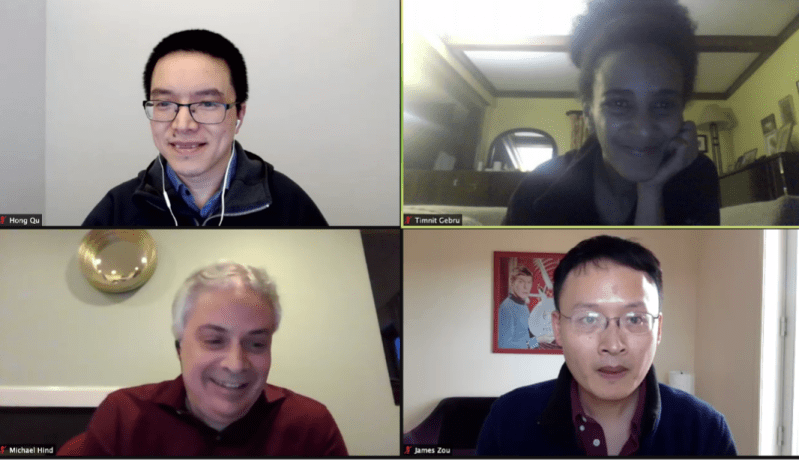As artificial intelligence becomes increasingly common in several areas of public life — from policing to hiring to healthcare — AI researchers Timnit Gebru, Michael Hind, James Zou and Hong Qu came together to criticize Silicon Valley’s lack of transparency and advocate for greater diversity and inclusion in decision making.
The event, titled “Race, Tech & Civil Society: Tools for Combating Bias in Datasets and Models,” was sponsored by the Stanford Center on Philanthropy and Civil Society, the Center for Comparative Studies in Race and Ethnicity and the Stanford Institute for Human-Centered Artificial Intelligence.
Qu, the moderator of the panel and a CCSRE Race & Technology Practitioner Fellow who developed a tool called AI Blindspot that discovers bias in AI systems, opened the conversation by discussing how there are two definitions of combating bias: ensuring that algorithms are “de-biased” and striving for equity in a historical and cultural context.
Gebru ’08 M.S. ’10 Ph.D. ’15 said that she was introduced to these issues as they relate to machine learning in AI after seeing a ProPublica article about recidivism algorithms, and a TED Talk by Joy Buolamwini, a graduate researcher at MIT, who discovered that an open-source facial recognition software did not detect her face unless she wore a white mask.
As Gebru moved higher up in the tech world, she noticed a severe lack of representation — a pressing inequity she is working to redress. “The moment I went to grad school, I didn’t see any Black people at all,” Gebru said.
“What’s important for me in my work is to make sure that these voices of these different groups of people come to the fore,” she added.
Michael Hind is an IBM Distinguished Researcher who leads work on AI FactSheets and AI Fairness 360, which promote transparency in algorithms. Hind agreed with Gebru, noting the importance of “having multiple disciplines and multiple stakeholders at the table.”
But not everyone has affirmed Gebru’s mission of inclusion. Last month, Google fired Gebru from her role as an AI ethics researcher after she had co-written a paper on the risks of large language models. Her paper touched on bias in AI and how social linguists, who study how language relates to power, culture, and society, were left out of the process.
Since the news of her firing broke, computer science educators and students showed their support and solidarity for Gebru and her work. When Qu asked the panelists how to increase racial literacy, Gebru responded, “I tried to do it and I got fired.”
She cited the “high turnover” of employees tasked to spearhead diversity initiatives, whose efforts to enact institutional change were often dismissed.
“They don’t have any power,” Gebru said. “They’re miserable. They leave.” Despite Google’s many ethics committees, “there’s just no way that this will work if there’s no incentive to change,” she added
Citing this culture of complacency as one of the reasons he left Silicon Valley, Qu said, “For me, I believe it’s more pernicious to be passively complicit than even to be intentionally malicious.”
In many cases, technology companies may even step beyond passive complicity, Gebru said. She cited Microsoft’s partnership with the New York Police Department to develop predictive policing algorithms. Because these technological tools rely on historical data, some researchers say they may reinforce existing racial biases.
“For any Black person in the United States who has had experiences with police,” Gebru said, “you would understand, you know, why predictive policing would be an issue.”
Zou, an assistant professor of biomedical data science at Stanford, remained optimistic about the use of AI for social good. He noted that because of the pandemic, the need for telehealth has exploded. Doctors are now relying on patients on images from patients to help diagnose them, and computer vision technology can help patients take better photos, he said.
Even cases of algorithmic bias can present valuable learning opportunities, Zou added. Pointing to language models he worked on as a member of Microsoft Research, Zou said that the models’ gender biases offered a way to “quantify our stereotypes.”
However, Zou was reluctant to place too much faith in AI.
“If it’s a scenario that affects someone’s health or safety, AI should not be the sole decision maker,” he said.
As the conversation ended, the researchers agreed on the need to continue questioning the role of using AI in tools that affect our daily lives.
“A lot of features certainly should not be ones a data scientist or engineer should be deciding,” Hind said.
He referred to how the virtual interviewing company HireVue used AI to analyze applicants’ videos to measure skills such as empathy and communication.
“Even if you can do it, should you?” Gebru asked.
Contact Patricia Wei at patwei ‘at’ stanford.edu and Jared Klegar at jkklegar ‘at’ stanford.edu.
